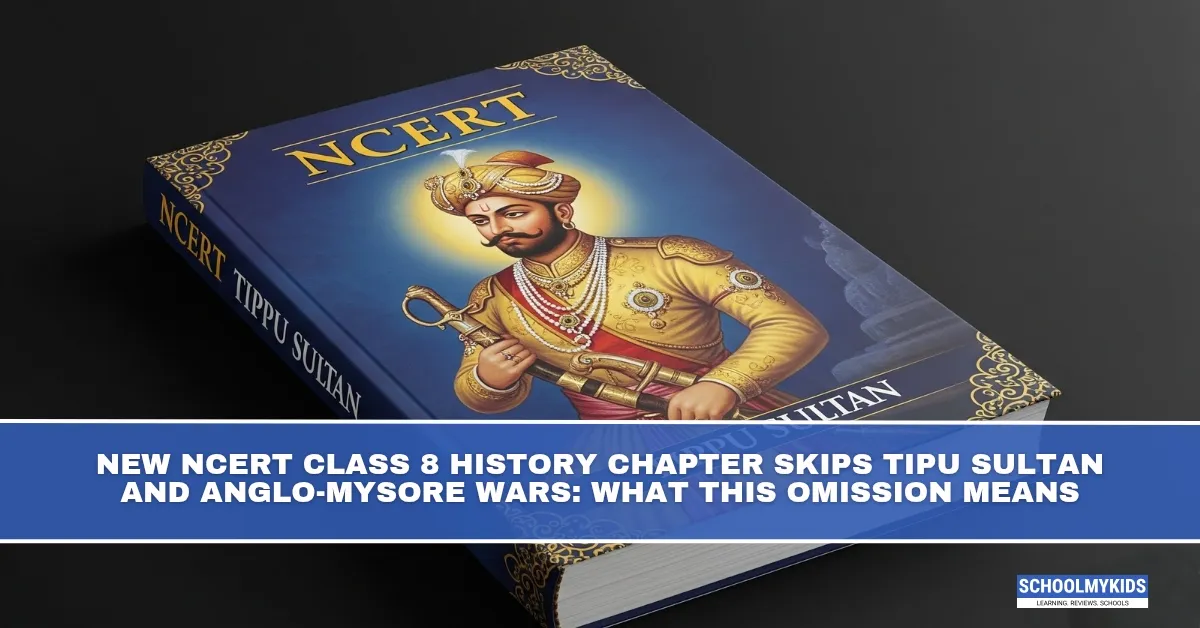In the latest revision to India's school curriculum, the Class 8 NCERT Social Science textbook has introduced a new chapter on British colonial rule that omits references to Tipu Sultan, Haidar Ali, and the Anglo-Mysore Wars — once staple topics in middle school history education.
This change has sparked conversation among educators, historians, and the public about what gets remembered — and what gets left out — when rewriting history for a new generation.
What’s New in the NCERT Book?
The new chapter, titled “Exploring Society: India and Beyond – Part 1”, has been released for the 2025–26 academic session. The chapter focuses on India’s social, cultural, and economic landscape under British colonial rule.
However, students and teachers have noticed that:
- Tipu Sultan, the ruler of Mysore known for resisting British expansion, is no longer mentioned.
- The Anglo-Mysore Wars, a crucial part of 18th-century Indian history, have been completely skipped.
- Haidar Ali, Tipu’s father and an important military leader, is also absent.
The National Council of Educational Research and Training (NCERT) has included a note in the book explaining that the intention was to simplify the content and that “no one should be held responsible today for events of the past.”
Why Tipu Sultan’s Omission Matters
Tipu Sultan has long been regarded as a symbol of resistance against British imperialism. He:
- Fought four major wars against the British East India Company
- Allied with the French to resist colonial domination
- Was one of the few Indian rulers who died on the battlefield defending his kingdom (1799)
His removal from textbooks could mean:
- A loss of regional history, especially in southern India where he remains a celebrated figure
- A shift away from anti-colonial narratives toward a more neutral, possibly sanitized version of history
- Reduced exposure to complex historical figures who were both admired and criticized in different contexts
What are the Anglo-Mysore Wars? A Quick Recap
The Anglo-Mysore Wars (1767–1799) were a series of four wars between the Kingdom of Mysore and the British East India Company. These conflicts were key in:
- Establishing British dominance in southern India
- Changing the power dynamics between Indian states and European powers
- Showcasing early organized Indian resistance to colonial forces
Omitting them may create an incomplete understanding of how colonial rule was established.
NCERT’s Justification: “Simplification and Sensitivity”
In response to growing scrutiny, NCERT officials have stated:
- The updated curriculum aims to reduce content overload for students
- The idea is to focus on broad themes rather than specific battles or individuals
- The exclusion is not ideological but pedagogical, part of a larger rationalization effort post-COVID
A cautionary note in the textbook mentions:
“No one should be held responsible today for the events of the past.”
However, critics argue that over-simplifying history can rob students of critical thinking and a deeper understanding of India’s complex past.
Reactions from Historians and Educators
Mixed Opinions:
- Some welcome the reduced textbook load and appreciate the effort to make history less overwhelming for students.
- Others fear this is part of a larger pattern of historical revisionism, where controversial or inconvenient facts are gradually being removed.
What Experts Say:
- Historian Irfan Habib called the move “academic vandalism”
- Educationist Anita Rampal warned of "whitewashing anti-colonial resistance"
- Many teachers are confused about how to address these gaps in the classroom
What Does This Mean for Students?
Students studying Class 8 history in 2025 and beyond will:
- Miss out on important regional histories that shaped modern India
- Learn colonial history through a more generalized lens
- Possibly grow up with less awareness of resistance movements that were once considered crucial to Indian identity
The Larger Pattern: Other Changes in Recent NCERT Editions
This is not an isolated case. In recent years:
- References to the Mughal Empire have been reduced or reframed
- Content on Gandhi’s assassination and Nathuram Godse was earlier dropped, then partially restored
- Chapters on caste, riots, and protest movements have been trimmed
Each of these has raised questions about how history is curated — and for whom.
Conclusion: History, Education, and Memory
The omission of Tipu Sultan and the Anglo-Mysore Wars from the Class 8 NCERT textbook marks a significant shift in how colonial India is being presented to young learners. While curriculum updates are a regular feature of education systems, the selective erasure of key figures invites scrutiny.
Ultimately, the question isn’t just “What do we teach?” but also “Why do we teach it?” and “What happens when we stop?”
As India reimagines its school history, it walks a fine line between simplifying learning and sanitizing the past.









Be the first one to comment on this story.